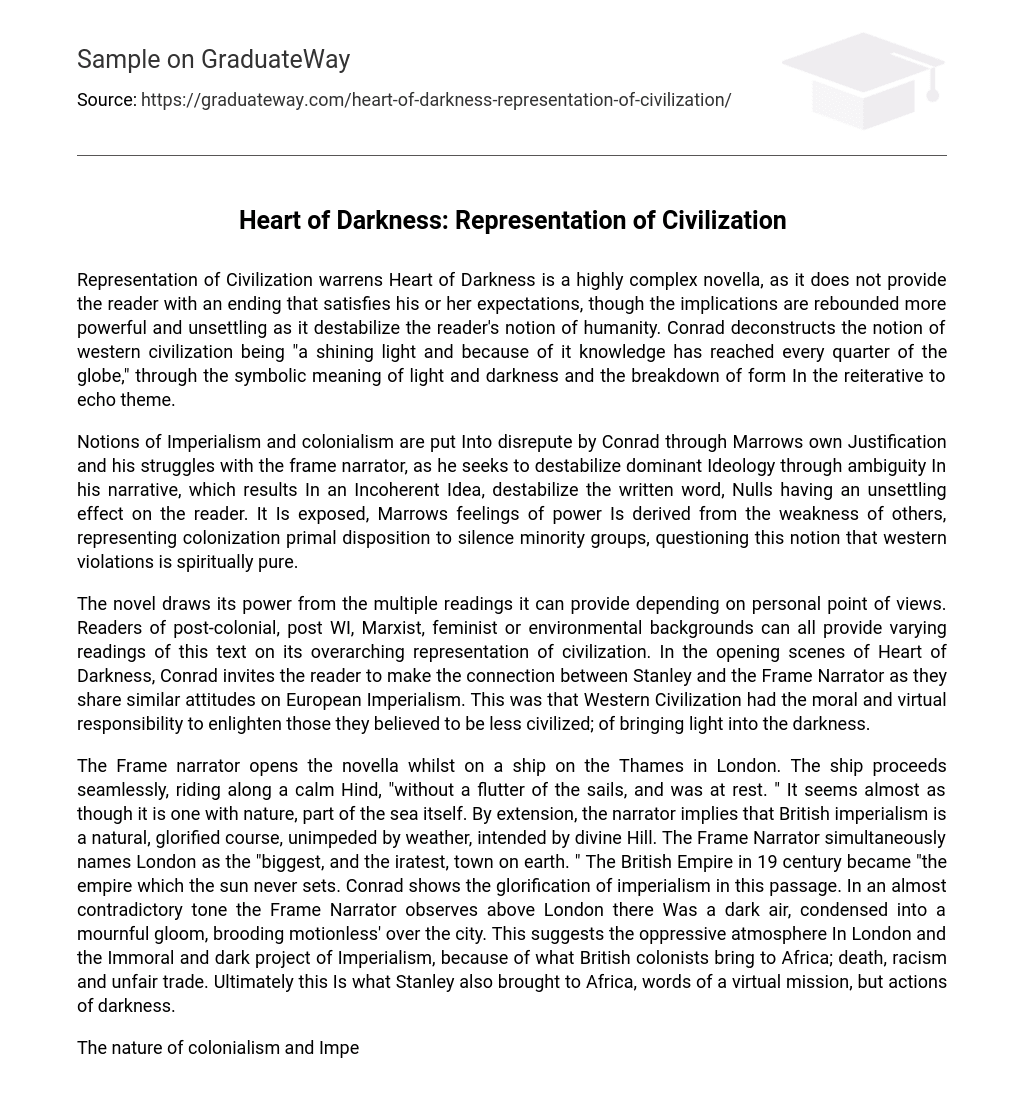Representation of Civilization warrens Heart of Darkness is a highly complex novella, as it does not provide the reader with an ending that satisfies his or her expectations, though the implications are rebounded more powerful and unsettling as it destabilize the reader’s notion of humanity. Conrad deconstructs the notion of western civilization being “a shining light and because of it knowledge has reached every quarter of the globe,” through the symbolic meaning of light and darkness and the breakdown of form In the reiterative to echo theme.
Notions of Imperialism and colonialism are put Into disrepute by Conrad through Marrows own Justification and his struggles with the frame narrator, as he seeks to destabilize dominant Ideology through ambiguity In his narrative, which results In an Incoherent Idea, destabilize the written word, Nulls having an unsettling effect on the reader. It Is exposed, Marrows feelings of power Is derived from the weakness of others, representing colonization primal disposition to silence minority groups, questioning this notion that western violations is spiritually pure.
The novel draws its power from the multiple readings it can provide depending on personal point of views. Readers of post-colonial, post WI, Marxist, feminist or environmental backgrounds can all provide varying readings of this text on its overarching representation of civilization. In the opening scenes of Heart of Darkness, Conrad invites the reader to make the connection between Stanley and the Frame Narrator as they share similar attitudes on European Imperialism. This was that Western Civilization had the moral and virtual responsibility to enlighten those they believed to be less civilized; of bringing light into the darkness.
The Frame narrator opens the novella whilst on a ship on the Thames in London. The ship proceeds seamlessly, riding along a calm Hind, “without a flutter of the sails, and was at rest. ” It seems almost as though it is one with nature, part of the sea itself. By extension, the narrator implies that British imperialism is a natural, glorified course, unimpeded by weather, intended by divine Hill. The Frame Narrator simultaneously names London as the “biggest, and the iratest, town on earth. ” The British Empire in 19 century became “the empire which the sun never sets. Conrad shows the glorification of imperialism in this passage. In an almost contradictory tone the Frame Narrator observes above London there Was a dark air, condensed into a mournful gloom, brooding motionless’ over the city. This suggests the oppressive atmosphere In London and the Immoral and dark project of Imperialism, because of what British colonists bring to Africa; death, racism and unfair trade. Ultimately this Is what Stanley also brought to Africa, words of a virtual mission, but actions of darkness.
The nature of colonialism and Imperialism being a business, rather than a holy mission, Is evident as the Frame Narrator begins Introducing his companions by their titles Instead of their names, “the Director of Companies was our Captain and host”. This Implies that the people Involved In colonial practice were looked at In terms of business as opposed to seeing the humanity in them. This is reflected with the aspect of imperialism striping away all establishes the idealistic idea of imperialism by describing the Director standing “in he bow looking seaward,” suggesting a heroic character.
His companions view him Ninth “trustworthiness personified,” suggesting that such a trustworthy and admirable man could not commit immoral crimes; that imperialism was not fuelled by financial motivations, but something more pure. This also suggests that a majority of people buy into the possibly false concept that the true purpose of imperialism is for teaching those being conquered the ways of ‘civilization’. Conrad utilizes light imagery and poetic imagery of nature around the ship whilst on the Thames to rather glorify the Journey the men are taking.
The narrator uses majestic and poetic language such as ‘radiant” and “diaphanous” to describe the setting around the boat. Nihilist traveling by the Essex Marshes, the narrator simultaneously calls it “misty’ and “gauzy,” perhaps symbolizing something that is concealing and potentially distorting vision and perspective. The effect of having the narrator describing their journey in this manner, could symbolism that the colonial mission is not as profound as it is made out to be, that the spiritual mission is Just a veneer for ivory trade.
The Thames itself is personified by the narrator as a servant to man by describing the atmosphere, nature and history of it, to glorify imperialism. The Thames conjures up images of famous British explorers for the Frame narrator and his fellow travelers, ere Director, The Lawyer and The Accountant (not Marrow). The narrator recounts the achievements of Sir Francis Drake and Sir John Franklin in a genuine celebratory tone, ‘knight’s errant” implying that such voyages served a sacred higher purpose.
The Narrators attitude is that these men promoted the glory of Great Britain and enlightened the rest of the world. The voyage of ‘Rebus Terror’ is also cited by the narrator, unbeknown that the first acts of cannibalism ‘darkness’ originated here. The narrator goes on however to say that all Journeys originating from the Thames bore often ” a torch” and were “messengers of the might within the land, bearers of a spark from the sacred fire The unanimity and anonymity of Marrows listeners combine to give the impression that they represent conventional perspectives and ‘aloes of British establishment.





